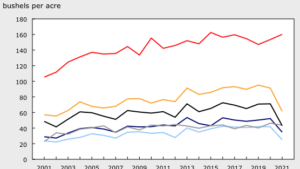Not so long ago, the EU decided that it would increase R&D investment from under two per cent GDP a decade ago to three per cent, currently aimed for by 2020, reflecting growing recognition that Europe must compete and excel in the new global knowledge economy.
The aim was to ensure increased investment, leading to high value jobs, growth and to greater sustainability. Indeed, R&D will undoubtedly be critical to delivering improved health, mitigating the worst impacts of climate change, and to delivering a truly resource efficient circular bioeconomy for people and planet. But 10 years down the road, there has not been sufficient progress on this goal and, as a result, Europe lags behind on several breakthrough technologies, notably in the area of agricultural biotechnology.

Genetically modified (GM) crops are now grown on 12 per cent of the world’s fields by 17 million farmers in 24 countries. And that’s no surprise as these crops reduce the need for using other inputs, like crop protection and fuel whilst improving yields and hence food security. However, only a small fraction of this amount is grown in Europe (mainly in Spain). And as a result, the EU is the second largest importer of GM-derived agricultural commodities, choosing instead to rely on other third countries to grow these on our behalf.
In the EU, the cost of authorising a new transgenic plant is between €11m – €16.7m and it takes about six years on average to get a mere import authorisation, both numbers have increased by 50 percent compared to ten years ago which is making the development of such innovations prohibitive.
Despite a history of more than 20 years of safe use of GM crops, and thousands of individual EU and other government approvals confirming their safety, this predicament prevails.
Small and medium sized enterprises (SMEs) have all but given up on investing in GM crop authorisations in Europe, considering the massive investments of time, money and expertise necessary for attaining authorisation. Even large multinational corporations have given up on GM cultivation in Europe.
A 2018 PG Economics report demonstrates that the impacts have been devastating, e.g. that the EU’s GMO regulations have cost the UK agricultural sector between €428m and €534m in farm income benefits in the period 1996-2006, with an additional €65m – €82m still slipping away each year. The report also states that the EU’s unsupportive regulatory environment has pushed out 900 science sector jobs and €77m worth of salaries.
In 2018 the EU Court of Justice ruled that plants without a novel combination of genetic material (i.e. non-transgenic plants without added genes) fall under the same prohibitive requirements as transgenic plants, and this only adds insult to injury in its contradiction of both science and common sense.
In considering the rationale for the current status quo, we must acknowledge that thousands of plant varieties already come from all kinds of mutations (natural, random or induced). Indeed, the current jurisprudence simply punishes the most efficient, precise and innovative methods for achieving desired plant traits, which can now be developed in a matter of months, rather than the decades or even centuries needed using traditional methods. Europe, the birthplace of plant biotech, has now been positioned at an even greater disadvantage due to the court ruling, especially in light of the urgent need for innovation to tackle the unprecedented global challenges we now face.
Associated with the current GMO legislation, is a regulatory burden that has already cost Europe millions in terms of lost investment, brain drain and jobs and has increased Europe’s susceptibility to trade disruptions, the impacts of which are estimated to range in the billions of euros.
The overall cost to the economy, in the case of disruption in supplies to the EU, because of asynchronous GMO approvals, could total €9.6bn according to a report published by the European Commission in 2010.
It’s already known that multinationals have massively divested from the EU and have focused their GM product development pipelines on solutions for farmers in other continents. The same will happen with the most modern precision breeding techniques, such as genome editing. Under the current jurisprudence, probably no gene-edited plants will be available for EU farmers in the foreseeable future.
However, Europe, despite all these setbacks, can still become a world leader in the global knowledge economy – but only if it takes action now.
In order to get there, first the EU leaders must recognise that scientifically unjustifiable regulatory burdens have contributed to the EU’s loss of competitiveness and to frictions with trading partners. Furthermore, the EU will need a proportionate, fit-for-purpose, science-based approach to modern technologies, which reflects technical progress.
At EuropaBio our fervent hope for the future is that the EU will take more leadership on this topic. This will ensure that both in Europe and in the rest of the world, we can all benefit from the full spectrum of biotechnology innovation, and that the EU will boost investment in R&D for this purpose, in recognition of this vast and important potential.













